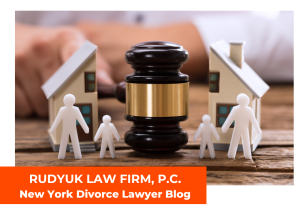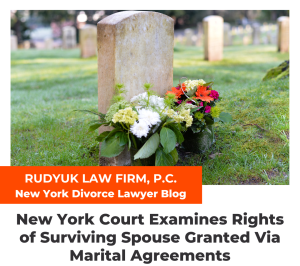 Family law disputes do not always end with divorce or death. In many cases, unresolved marital agreements resurface after a spouse passes away, placing surviving family members in prolonged litigation. A recent New York decision illustrates how prenuptial agreements, marital housing rights, and waiver of spousal interests can become central family law issues long after a marriage has ended by death. If you have questions about your rights regarding a prenuptial agreement, it is critical to consult an experienced New York family law attorney to protect your interests.
Family law disputes do not always end with divorce or death. In many cases, unresolved marital agreements resurface after a spouse passes away, placing surviving family members in prolonged litigation. A recent New York decision illustrates how prenuptial agreements, marital housing rights, and waiver of spousal interests can become central family law issues long after a marriage has ended by death. If you have questions about your rights regarding a prenuptial agreement, it is critical to consult an experienced New York family law attorney to protect your interests.
Case Setting
It is reported that the plaintiff commenced an action seeking possession of a cooperative apartment following the death of the decedent. Allegedly, the defendant was the decedent’s surviving spouse who continued to reside in the apartment despite prior court proceedings addressing her rights under a marital trust and a prenuptial agreement.
It is alleged that earlier litigation determined that the defendant could not compel the cooperative to transfer the apartment shares into a marital trust and therefore had no legal right to occupy the apartment. Following that determination, the plaintiff sought ejectment and a declaration of exclusive possession.
Reportedly, the defendant responded by asserting counterclaims, alleging that her waiver of spousal inheritance rights was invalid for lack of consideration and that the prenuptial agreement obligated the plaintiff to provide a comparable replacement residence. The trial court entered a default judgment on the ejectment claims and dismissed all counterclaims, prompting the appeal.
 New York Divorce Lawyer Blog
New York Divorce Lawyer Blog











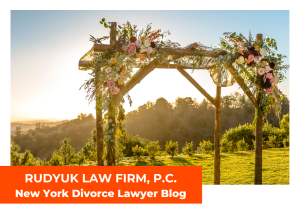 In New York divorce litigation, the threshold question of whether a valid marriage exists can be outcome-determinative. When parties participate in a religious ceremony without obtaining a marriage license, courts must carefully assess whether the ceremony satisfies statutory requirements for a legally recognized marriage. A recent
In New York divorce litigation, the threshold question of whether a valid marriage exists can be outcome-determinative. When parties participate in a religious ceremony without obtaining a marriage license, courts must carefully assess whether the ceremony satisfies statutory requirements for a legally recognized marriage. A recent 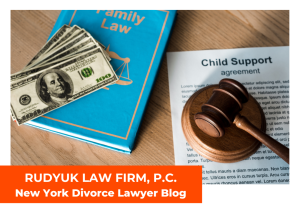 In New York child support cases, it is not uncommon for one parent to request an upward modification if they believe the other parent’s income has increased. However, courts require clear, specific proof before altering an existing support order. A recent New York
In New York child support cases, it is not uncommon for one parent to request an upward modification if they believe the other parent’s income has increased. However, courts require clear, specific proof before altering an existing support order. A recent New York 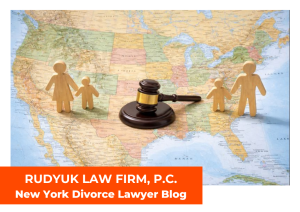 In interstate and international custody disputes, even the most urgent requests can be denied if the court lacks proper jurisdiction over a parent. In other words, procedural rules governing service of process and notice are not mere technicalities but fundamental safeguards that ensure fairness and due process. A recent New York
In interstate and international custody disputes, even the most urgent requests can be denied if the court lacks proper jurisdiction over a parent. In other words, procedural rules governing service of process and notice are not mere technicalities but fundamental safeguards that ensure fairness and due process. A recent New York 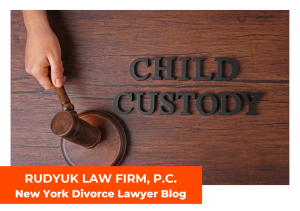 In New York family law, few issues are as emotionally charged as disputes over a parent’s right to consent to a child’s adoption. When a parent has been absent from a child’s life for years, courts must weigh the child’s stability, safety, and emotional needs against the parental rights of a biological parent seeking renewed involvement. A recent New York
In New York family law, few issues are as emotionally charged as disputes over a parent’s right to consent to a child’s adoption. When a parent has been absent from a child’s life for years, courts must weigh the child’s stability, safety, and emotional needs against the parental rights of a biological parent seeking renewed involvement. A recent New York 